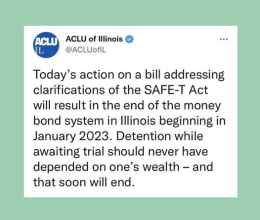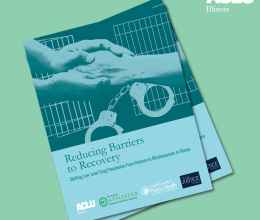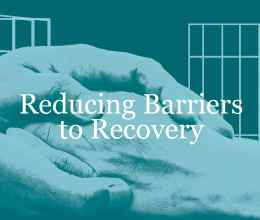
The State of Illinois has reached -- and passed -- a tipping point and must act now to reduce the number of persons incarcerated in our prisons, according to the American Civil Liberties Union of Illinois. In testimony prepared for a hearing today of the legislature's Joint Criminal Justice Reform Committee, the ACLU will tell the Committee that Illinois is no longer able to "provide the adequate, constitutionally-mandated level of care for those adults and juveniles who are incarcerated in the State." The ACLU of Illinois is currently involved in litigation challenging conditions of confinement in all the State's juvenile justice facilities as well as a separate case that points out the flaws in the healthcare system operated within the Illinois Department of Corrections.
Associate Legal Director Ben Wolf will summarize the situation for the Committee, noting that "now is not the time for half measures. The current system cannot be sustained and cries out for immediate and bold reform."
Illinois currently incarcerates more than 48,000 people in state prisons, the eighth (8th) highest prison population in the nation. The ACLU's testimony points out that while other large states across the U.S. have implemented a number of reforms that have reduced their prison population in recent years, the State of Illinois' prison population has ballooned to more than 190% of capacity. Indeed, Illinois' incarceration rate is 40% higher than New York State and 50% higher than New Jersey, states where critical reforms already have been implemented.
The ACLU notes that Illinois' over-reliance on incarceration and long, mandatory sentences not only wreaks havoc on the State's fiscal condition (crowding out other State priorities), over-incarceration also means that the system is unable to provide adequate services and medical care, causing unnecessary cruelty and harm.
A number of factors, the ACLU reports, have driven this increase in prison and jail population. For example, in the decades since the State moved to a determinate sentencing system and established Class X felonies, the prison population has more than quadrupled. Other factors driving prison population in Illinois include legislation lowering the drug quantity thresholds required for severe sentences (in 1998), and the adoption of so-called "Truth in Sentencing" for serious offenses in 1995, requiring that people convicted of certain offenses remain in prison for a fixed portion of their sentence, regardless of good time served. Chicago Mayor Emanuel and Police Superintendent Garry McCarthy will appear before the Committee today, and are expected to argue that a new mandatory minimum sentence should be adopted to address gun crime in the City. It should be noted that existing mandatory minimum sentences and other misguided approaches adopted in the past have brought the State to the point of crisis that exists today and must be resisted.
To begin the process of reducing the population in our prison system, the ACLU will offer a series of very specific recommendations, including:
- Decriminalizing the possession of small amounts of marijuana, and ease penalties for low-level sale and possession with intent to sell marijuana.
- Reclassify the simple possession of small quantities of other drugs as a misdemeanor, raise the amount of drugs required to trigger enhanced and mandatory sentences and exempt drug offenses from repeat felony enhancements.
- Scale down the drug-free zone size down from 1,000 to 250 feet, and require proof that a defendant intended to sell when school children are present.
- Increase the theft threshold to reflect both inflation and the seriousness of the crime and eliminate the felony enhancements for small time thefts with a prior property crime.
- Restructure commercial and non-residential burglary sentencing so sentences reflect whether or not anyone was present in the structure at the time of the offense.
- Limit the crimes for which probation is not an option only to the most serious offenses.
- Establish a system of risk-reductions credits so even people convicted of serious offenses can earn time off their sentences for completing in-prison programming.
- Revisit current limitations of the availability of sentencing credits for those who have served a sentence to DOC in the past, as well as limits on a term of days required to be served in the DOC prior to the application of sentencing credits.
The ACLU notes that these type of opportunities, which have been missed in Illinois, have worked in other states to reduce the prison population in an effective way. The ACLU's Wolf also will say that "waiting is not an option. Now is the time to move away from failed policies of over-incarceration."
# # #
Editor's note: The Joint Criminal Justice Reform Committee's hearing begins at 10:00 a.m. today in C-600, 6th Floor of the Bilandic Building in Chicago. The ACLU of Illinois' Ben Wolf will testify shortly after Mayor Emanuel and Superintendent McCarthy has concluded.






